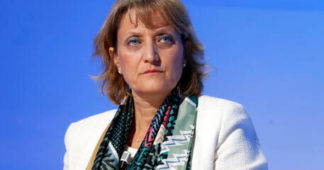Israel has been engaging far-right groups and parties across Europe, ignoring their anti-Semitism.
By Ramzy Baroud
internationally-syndicated columnist, a media consultant, an author.
Romana Rubeo
freelance writer and translator based in Italy
Jul 17, 2018
In November 2017, the Zionist Organization of America (ZOA) hosted a gala dinner in New York City honouring Stephen Bannon, US President Donald Trump‘s then-chief strategist.
That Bannon and his media outlet Breitbart News were, and still are, seen by many as anti-Semitic was of no consequence to Zionist leaders from the US and Israel, who were in attendance.
There were, however, some critical voices from within the Jewish community who denounced the ZOA for its decision to invite Bannon. One of them was former Jerusalem Post editor-in-chief Bret Stephens, who dedicated a column in the New York Times on the issue.
“Just as there are anti-Zionist Jews, there are also anti-Semitic Zionists,” Stephens wrote. He then went on to condemn Bannon’s indirect link to neo-Nazi Richard Spencer who, according to Stephens, advocates a “factitious theory that Israel is the sort of ethno-nationalist state he’d like to see America become.”
While Stephens was right to be outraged about the gala dinner, he is wrong to claim that Israel is not an ethnonationalist state.
Just recently, the Israeli government endorsed the Nation-State Bill, which among many racist provisions, calls for the establishment of Jewish-only towns. This bill alone should be enough to settle the silly debate on whether Israel can be both a Jewish nation-state and a democracy.
But relations between Israel and its lobby groups and racist, neo-Nazi and fascist organisations go way deeper than a one-off gala dinner with Steve Bannon. In fact, in Europe, Israel is actively pursuing alliances with far-right groups and parties as a state policy.
Embracing the far right from Italy to Ukraine
“Israel’s Ministry of Foreign Affairs, President [Reuven] Rivlin, his predecessor, President [Shimon] Peres, and the former Knesset Speaker all refused to meet members of extreme European right-wing parties and called on all Israeli parties to refrain from such meetings,” reported the Jewish American newspaper Forward last March.
But members of the Likud partyhaven’t followed suit. During the Ariel Sharon government in the early 2000s, Italian post-fascist Gianfranco Fini paid a visit to Israel.
At that time Fini, the leader of the Movimento Sociale Italiano (Italian Social Movement), the ideological successor of the anti-Semitic Fascist Party, was trying to rebrand his movement.
He started by changing the name to the “National Alliance” and then, to solidify its new image, he embarked on a trip to Israel, in the company of Amos Luzzatto, the head of the Italian Jewish community.
Today, the National Alliance is long gone, as it was dismantled under the pressure of its own corruption and multiple scandals. However, the constituency that brought the National Alliance to prominence mobilised in full force in this year’s elections in Italy and voted for the far-right League Party under the leadership of the current Italian Interior Minister Matteo Salvini.
Unsurprisingly, Salvini too went through the same political baptism by Israel as Fini did. In March 2016, he paid a visit to Tel Aviv to launch his political career.
“Israel embodies the perfect balance of different realities, while ensuring law and order. It surely is a role model for security and anti-terrorism policies,” he said during his trip.
At the Karim Abu Salem crossing between Israel and Gaza, Salvini condemned the Palestinian resistance movement, Hamas, while announcing the League’s “readiness to be part of the government of Italy”.
To the north of Italy, the far-right Alternative for Germany (AfD) party has also registered remarkable electoral success. And it, too, is establishing solid ties with Israel, despite its racist views.
“[T]he party derided for anti-Semitic, xenophobic views redolent of the Nazis is also staunchly supportive of Israel,” reported the Times of Israel. “[It is] one of a number of right-wing populist parties in Europe that have tried to make common cause with Israel’s tough stance toward terror and self-styled position as a forward bulwark against Islamic extremism.”
Last April, the anti-Muslim, anti-Semitic AfD, enthusiastically launched a campaign pushing for the recognition of Jerusalem as Israel’s capital, despite PM Angela Merkel‘s opposition to it.
Israel has also reached out to Hungarian PM Viktor Orban who for the past few years has been leading a vicious political campaign against the Jewish Hungarian American financier, George Soros.
Accusations of anti-Semitism against Orban and his party did not deter PM Benjamin Netanyahu from visiting him in Budapest in July last year.
But the move that perhaps best illustrates where Israel is headed in its support for the far right in the West is its decision to arm the Azov battalion, a neo-Nazi paramilitary organisation in Ukraine.
Human rights activists recently petitioned the High Court of Justice in Israel to stop the government from selling weapons to such groups after their appeal to the Israeli defence ministry produced no response.
Why is Israel allying with the far right?
Indeed, Israel’s embrace of far-right movements is now the defining Israeli attitude towards European politics, in general.
This Israeli strategy, of course, has its own logic. During his July 2017 visit to Budapest, Netanyahu met leaders from the so-called “Visegrad Group”, which includes Hungary, Poland, the Czech Republic and Slovakia.
There, he hoped to find new allies that he can use to exert pressure on the rest of the EU. In an audio recording obtained by Reuters, Netanyahu derided “Old Europe” for daring to criticise Israel’s dismal human rights record, illegal settlement policies and military occupation. “I think Europe has to decide whether it wants to live and thrive or it wants to shrivel and disappear,” he said.
Netanyahu needs new ways to pressure Europe because pro-Palestinian policies and attitudes are slowly but steadily entering mainstream politics, as grassroots groups are becoming increasingly outraged by Israeli crimes against Palestinians.
Israel’s fear of Europe abandoning its Zionist cause could be seen in recent Israeli official reactions.
On July 12, Israeli Defense Minister Avigdor Lieberman called for the “immediate” closure of his country’s embassy in Dublin, after the upper house of the Irish parliament voted in favour of a bill that could boycott Israeli products manufactured in illegal Jewish settlements in the Occupied Palestinian Territories.
Around the same time, EU Ambassador in Tel Aviv Emanuele Giaufret condemned the Nation-State Bill saying, “The law stinks of racism, and it discriminates against various groups, particularly Arabs.” The Israeli government responded by accusing the EU of interfering in its “internal affairs”.
The Israeli government seems intent on weakening Europe by investing in existing divisions and offering political validation to groups that, until recently, were on the political fringes.
It hopes that a divided Europe will be more easily controlled and coaxed back into Israel’s loyalty camp.
It remains to be seen whether Israel’s embrace of far-right, neo-Nazi and fascist Europe will pay off, the way its government hopes for, or whether it would backfire exposing it for what it truly is: an ethnonationalist state with no interest in true democracy and equality.
Also read
Mercenaries in Ukraine thank Israeli government
We remind our readers that publication of articles on our site does not mean that we agree with what is written. Our policy is to publish anything which we consider of interest, so as to assist our readers in forming their opinions. Sometimes we even publish articles with which we totally disagree, since we believe it is important for our readers to be informed on as wide a spectrum of views as possible.











